"Cherishing Little Steps - A Haven for Baby and Family Journeys"
Planning Balanced Meals for Toddlers: A Weekly Guide
When it comes to planning balanced meals for toddlers, the key is in creating a well-rounded menu that meets their nutritional needs. By considering factors like portion sizes, food variety, and meal timing, you can ensure your little one gets the essential nutrients for healthy growth. But what about those picky eaters or busy schedules that can throw a wrench in your meal planning efforts? Stay tuned to discover practical tips and creative ideas to navigate these challenges and make mealtime a breeze for both you and your toddler.
Key Takeaways
- Include a variety of food groups for balanced nutrition.
- Plan nutrient-dense snacks like fruits and whole grains.
- Consider meal prepping for convenience and time-saving.
- Engage toddlers in meal planning for healthy eating habits.
- Adjust portion sizes based on age and activity level.
Nutritional Needs of Toddlers
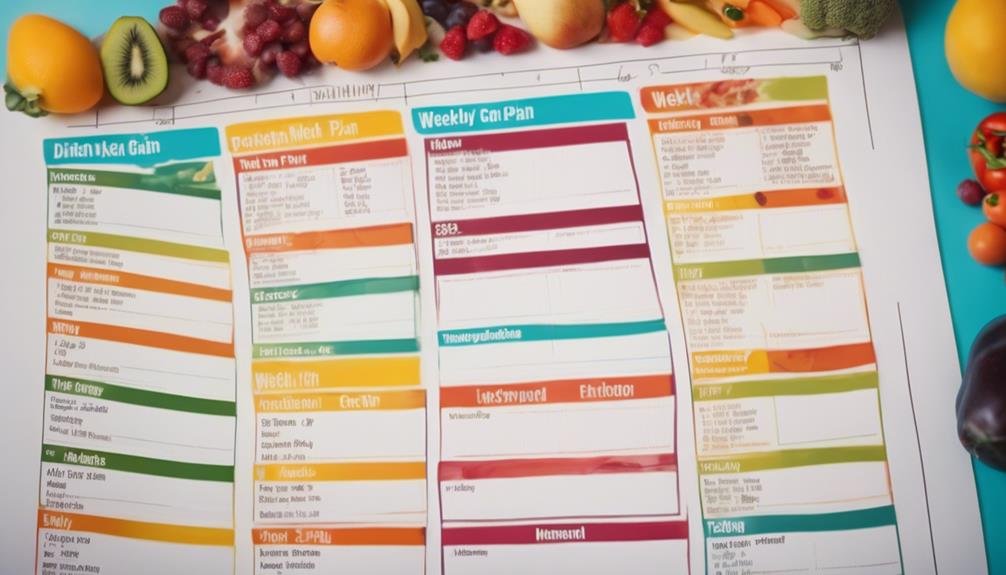
Meeting the nutritional needs of toddlers is crucial for their growth and development. Toddlers require a balanced diet to support their rapid physical and cognitive development. Key nutrients such as protein, carbohydrates, healthy fats, vitamins, and minerals are essential for their overall health. Protein is necessary for building and repairing tissues, while carbohydrates provide energy for their active play and exploration. Healthy fats are crucial for brain development, and vitamins and minerals play vital roles in various bodily functions.
Iron and calcium are two essential minerals that toddlers need for proper growth. Iron is crucial for healthy blood development and overall growth, while calcium is essential for building strong bones and teeth. Including iron-rich foods like lean meats, beans, and fortified cereals in your toddler's diet can help prevent iron deficiency. Likewise, offering calcium-rich foods such as dairy products, fortified plant-based milk, and leafy greens can support their bone development.
Building a Balanced Plate
To ensure your toddler receives the necessary nutrients for growth and development, focus on constructing a balanced plate that incorporates a variety of food groups. Start by offering a combination of foods to create a well-rounded meal. Here are some tips to help you build a balanced plate for your little one:
- Include a source of lean protein, such as chicken, fish, beans, or tofu.
- Add a serving of whole grains like brown rice, whole grain bread, or quinoa.
- Incorporate a variety of colorful fruits and vegetables to provide essential vitamins and minerals.
- Include a source of healthy fats, such as avocado, nuts, or olive oil, to support brain development.
- Offer dairy or dairy alternatives like milk, yogurt, or cheese for calcium and vitamin D.
Breakfast Ideas
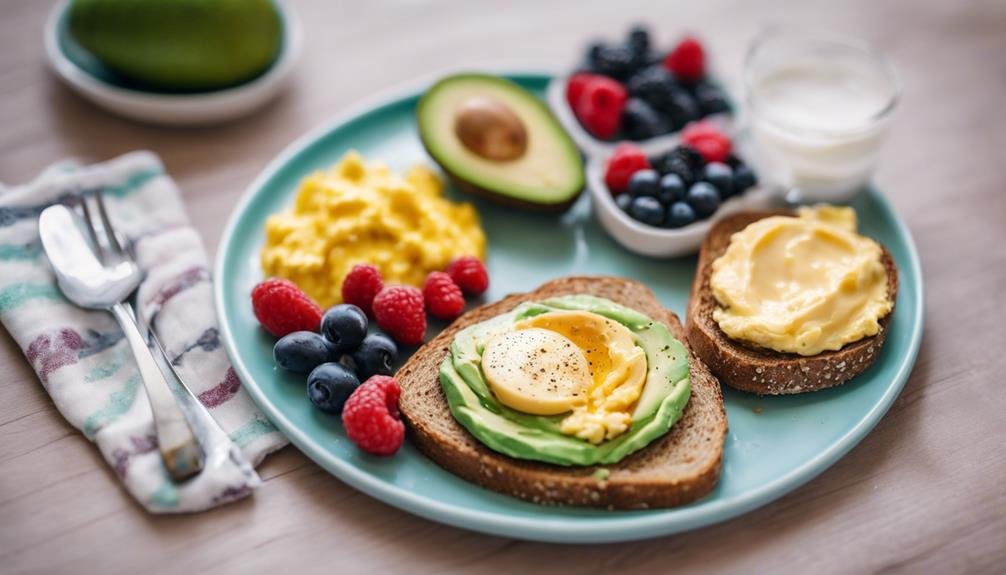
For a nutritious start to your toddler's day, consider incorporating a variety of wholesome ingredients into their breakfast meal. Breakfast is a crucial meal that provides the energy needed to kickstart your little one's day. Aim for a balanced breakfast that includes a mix of carbohydrates, proteins, and healthy fats.
Some breakfast ideas for toddlers include oatmeal topped with fresh fruits and a sprinkle of chia seeds for added nutrition. Greek yogurt paired with granola and a drizzle of honey can also be a delicious and filling option. Eggs are a fantastic source of protein, so scrambled eggs with whole grain toast and avocado slices can make a satisfying meal.
Smoothies are another great way to pack in nutrients. Blend together spinach, banana, and almond butter for a tasty green smoothie that your toddler will love. Remember to offer water or milk alongside breakfast to keep your little one hydrated throughout the morning. By including a variety of nutrient-dense foods, you can ensure that your toddler starts their day off right.
Lunch Ideas
When planning nutritious lunch options for your toddler, focus on incorporating a variety of food groups to ensure a well-rounded meal. Lunchtime provides an opportunity to introduce new flavors and textures while meeting your child's nutritional needs. Here are some balanced lunch ideas to keep your little one satisfied and nourished:
- Mini Turkey and Cheese Roll-Ups: Roll slices of turkey and cheese together and cut them into bite-sized pieces for a protein-packed lunch.
- Veggie Quesadillas: Fill whole wheat tortillas with diced vegetables and a sprinkle of cheese, then toast until crispy for a tasty and colorful meal.
- Tuna Salad Sandwich: Mix canned tuna with Greek yogurt, diced apples, and a dash of lemon juice for a refreshing twist on the classic sandwich filling.
- Sweet Potato and Black Bean Tacos: Mash cooked sweet potatoes and black beans together, then spoon the mixture onto small tortillas for a fiber-rich and flavorful lunch option.
- Mini Whole Wheat Pita Pizzas: Top mini whole wheat pitas with tomato sauce, veggies, and cheese, then bake until the cheese is melted and bubbly for a fun and customizable meal.
Snack Time Options
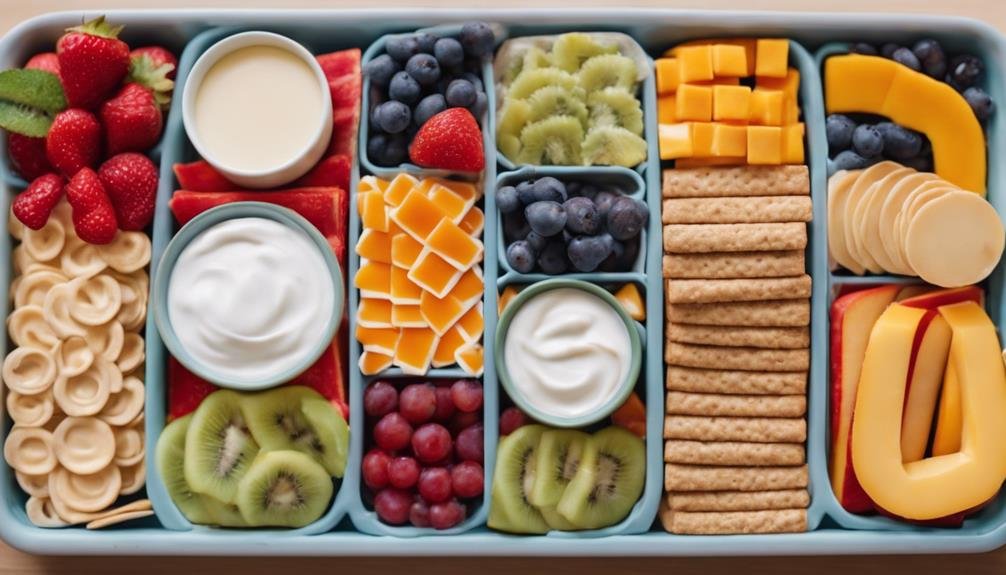
During snack time, toddlers can enjoy a variety of nutritious options to keep them energized and satisfied between meals. Opt for fresh fruit slices like bananas, apples, or berries, which provide essential vitamins and natural sweetness.
Additionally, whole grain crackers or rice cakes topped with nut butter can offer a good balance of carbohydrates and healthy fats. Greek yogurt with a sprinkle of granola is another tasty and protein-rich snack that toddlers tend to love.
Veggie sticks such as carrots, cucumbers, or bell peppers paired with hummus can introduce different textures and flavors while providing essential nutrients. For a fun twist, try making mini whole grain muffins with added shredded veggies like zucchini or carrots for a sneaky dose of vegetables.
Remember to offer water or milk to drink alongside snacks to keep your little one hydrated. These snack options not only keep toddlers satisfied but also contribute to their overall health and well-being.
Dinner Inspiration
To continue nourishing your toddler with balanced meals, consider some creative and nutritious dinner inspirations that cater to their growing needs and tastes. As the day winds down, providing your little one with a wholesome and satisfying dinner is crucial for their overall health and well-being.
Here are some dinner ideas to keep your toddler engaged and well-fed:
- Mini Meatballs with Veggie Pasta: Sneak in some extra veggies by mixing them into the meatballs and serving them with whole-grain pasta.
- Chicken and Sweet Potato Mash: A comforting and nutrient-rich meal that provides a good balance of protein and carbohydrates.
- Vegetable Stir-Fry with Tofu: Colorful and flavorful, this dish offers a variety of vitamins and minerals essential for your toddler's growth.
- Salmon Tacos: A fun twist on traditional tacos, packed with omega-3 fatty acids for brain development.
- Quinoa and Black Bean Bowl: A protein-packed vegetarian option that's easy to customize with your toddler's favorite toppings.
These dinner inspirations won't only keep your toddler satisfied but also support their nutritional needs for optimal growth and development.
Hydration Tips
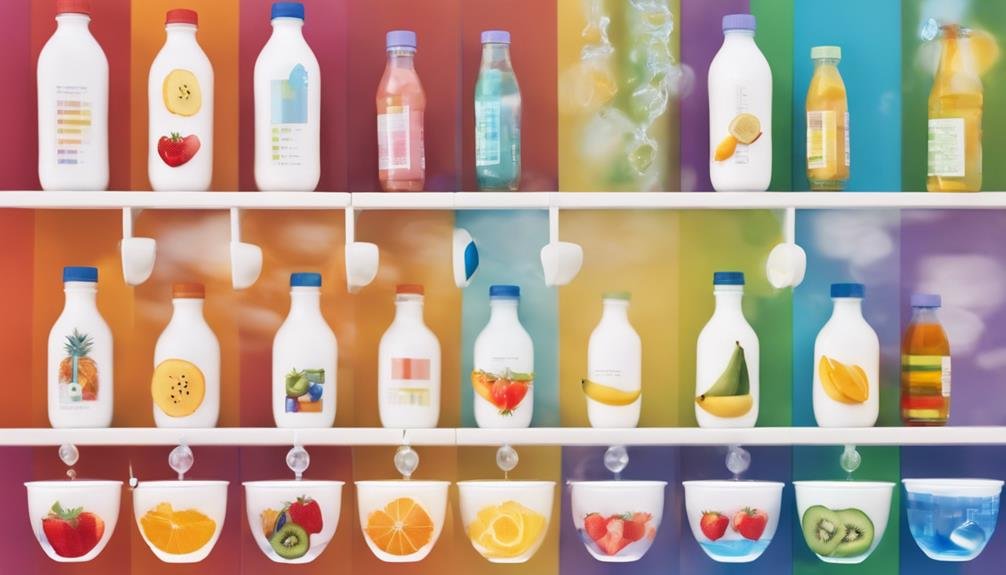
For optimal health and well-being, ensuring your toddler stays adequately hydrated throughout the day is essential. Toddlers have higher water requirements per pound of body weight than adults, making proper hydration crucial for their growth and development. To help your little one stay hydrated, offer water frequently throughout the day, especially between meals and snacks. Encouraging your toddler to drink small amounts of water regularly can prevent dehydration and promote healthy hydration habits.
Limiting the intake of sugary drinks like soda and fruit juices is important as they can contribute to excess calorie consumption and tooth decay. Instead, opt for water as the primary beverage choice for your toddler. If your child isn't a fan of plain water, you can infuse it with fruits like berries or citrus for added flavor without the added sugars.
Weekly Meal Planning
Ensuring your toddler's nutrition is well-rounded and balanced involves thoughtful weekly meal planning to support their growth and development effectively. Planning ahead can help you provide a variety of nutrients essential for your little one's health.
Here are some tips to help you create a balanced meal plan for your toddler:
- Include a Variety of Food Groups: Aim to include foods from all food groups to ensure your toddler receives a wide range of nutrients.
- Plan Nutrient-Dense Snacks: Choose healthy snacks such as fruits, vegetables, whole grains, and dairy products to keep your toddler satisfied between meals.
- Consider Texture and Consistency: Offer a mix of soft, easy-to-chew foods along with more challenging textures to support your toddler's oral motor skills development.
- Get Creative with Presentation: Make meals visually appealing by incorporating different colors, shapes, and textures to attract your toddler's interest.
- Involve Your Toddler: Encourage your child to participate in meal planning and preparation to foster a positive attitude towards food and develop healthy eating habits.
Grocery Shopping Guide
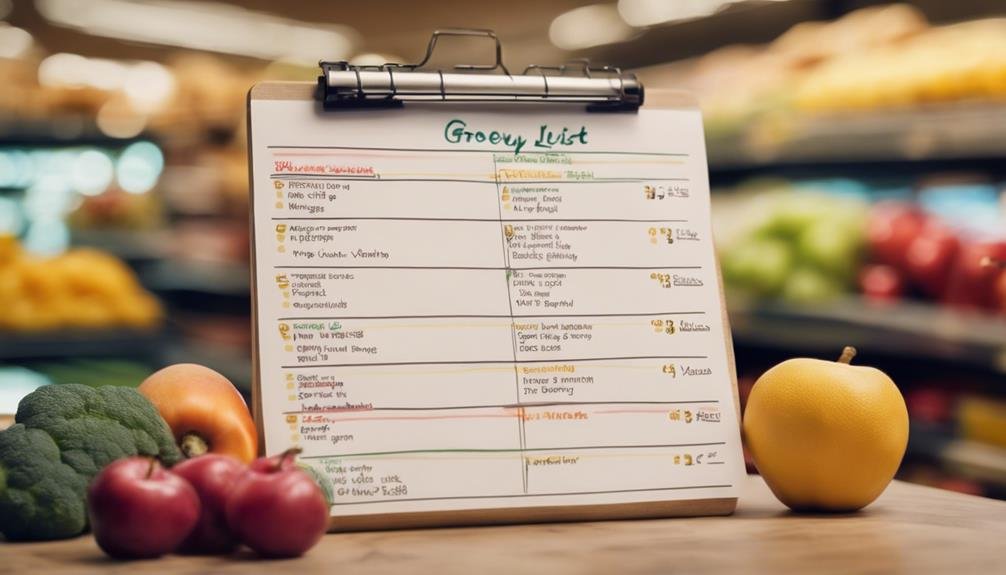
When creating your grocery shopping guide for your toddler's balanced meals, focus on selecting a variety of nutrient-dense foods from all food groups to support their growth and development effectively. Aim to include fruits, vegetables, whole grains, lean proteins, and dairy or dairy alternatives in your shopping list. Opt for fresh produce when possible and choose whole grains like brown rice, quinoa, or whole-grain bread to provide essential nutrients and fiber.
Look for lean proteins such as chicken, turkey, tofu, or legumes to promote muscle development and overall health.
Include dairy or fortified dairy alternatives like almond milk or soy yogurt to ensure an adequate intake of calcium for bone growth. When selecting fruits and vegetables, opt for a rainbow of colors to provide a wide range of vitamins and minerals.
Remember to read food labels and choose items with lower added sugars and sodium content to promote healthy eating habits from a young age.
Frequently Asked Questions
How Can I Encourage My Picky Toddler to Try New Foods?
To encourage your picky toddler to try new foods, involve them in meal prep, offer choices within healthy options, and be a role model by enjoying a variety of foods. Keep introducing new items without pressure, and celebrate small victories.
Are Organic Foods Necessary for a Toddler's Diet?
You don't have to choose only organic for your toddler. While organic foods can be beneficial due to lower pesticide exposure, focus on a variety of fruits, veggies, whole grains, and proteins for a well-rounded diet.
Can Toddlers Consume Plant-Based Diets Safely?
Yes, toddlers can consume plant-based diets safely with proper planning. Ensure they get enough nutrients like iron, calcium, and vitamin B12 from fortified foods or supplements. Consult a pediatrician or dietitian for guidance.
Should I Be Concerned About My Toddler's Eating Habits?
Don't fret excessively about your toddler's eating habits. While some concern is natural, remember that children's appetites fluctuate. Keep offering nutritious foods, create a positive meal environment, and trust their instincts.
What Are Some Creative Ways to Involve Toddlers in Meal Preparation?
Get your little one engaged by letting them help wash veggies, stir ingredients, or set the table. Encourage creativity with fun shapes and colors. Involving toddlers in meal prep can foster a positive relationship with food.
Conclusion
In conclusion, by planning balanced meals for your toddler each week, you're setting them up for a lifetime of healthy eating habits and optimal growth and development.
With a variety of nutrient-dense foods from all food groups, you can ensure they're getting all the essential nutrients they need.
So, why not start incorporating more fruits, vegetables, lean proteins, and whole grains into your toddler's diet today? Your little one will thank you for it in the long run.



I share the same level of fascination with your work as you have attained. Your sketch is very beautiful and your written material is excellent. But, I believe you are concerned that you may be doing some unconventional activities going forward. I concur that you will sort this out shortly.